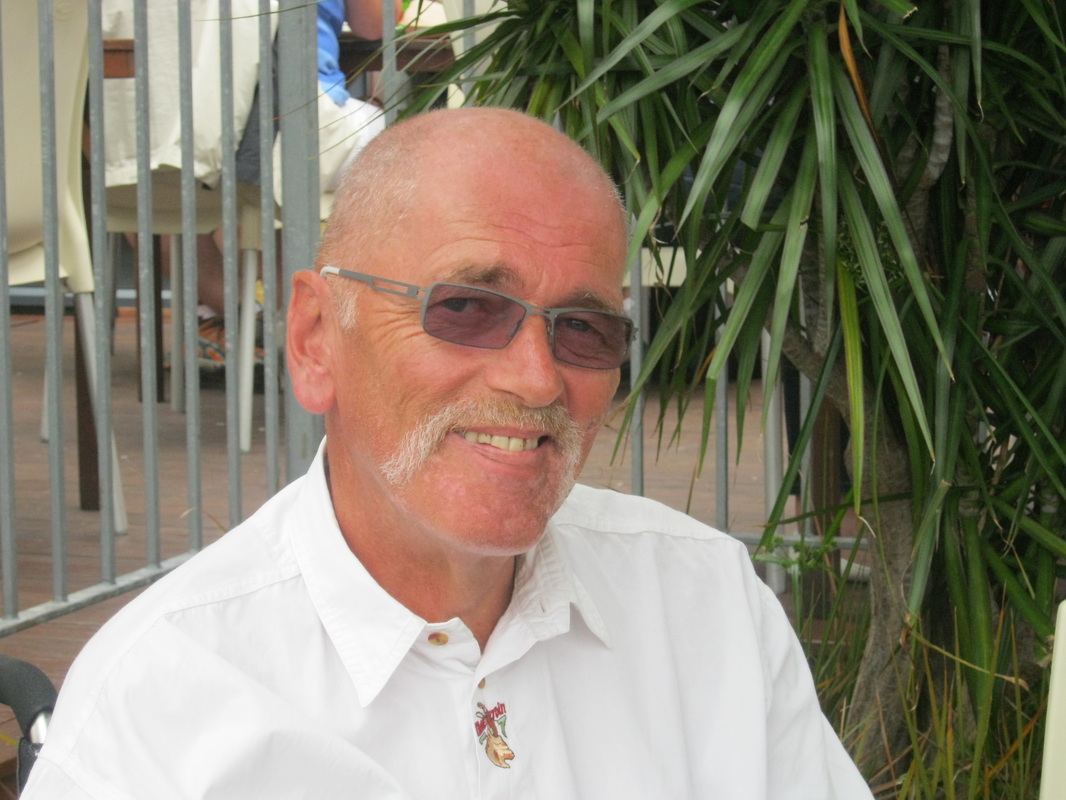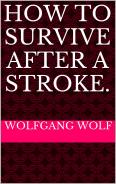The author starts with his own time in hospital, draws on experiences of other survivors, and concludes with suggesting a mentor system to help patients building self esteem and benefit their long term rehabilitation.
Main copy Suddenly someone or something slammed on the breaks. Everything came to a stand still. It was an inoperable brainstem stroke. My whole body had shut down and consequently a tracheotomy was performed and I was put on a respirator. I needed a lot of rest, which I got while in a coma in the critical care unit. After a “Near-Death-Experience” I ended up in the Intensive Care Unit where I still had locked-in syndrome. Finally, when I was moved to a private room, physio-therapy was started. All it was at this stage, they got me out off bed and sat me in a chair next to it. I was strapped in and left there for an hour, or so, my thoughts wandering between embarrassment and bewilderment. Nevertheless it was positive, because I was moving forward. Never mind the Deep Vein Thrombosis (DVT) I got while lying in a ward, and the two Pulmonary Embolisms they found when they performed the angiogram. My last procedure in hospital was to have a Birds nest Filter (Green Filter in the USA) inserted into my Vena Cava. It was to prevent blood clots from entering my lungs. Then, after 4 ½ months in hospital I was sent on my way. This was as good as it gets.
At home I felt scared, lost, like a foreigner who doesn’t belong in this world. I realized that I was out off my comfort zone. My comfort zone used to be my hospital bed. At first. Then it was extended to across the road. My occasional outings. Always with my ex-wife, or a nurse. They were my security cushion. It was safe.
But now, this security cushion was not there anymore. Many other Stroke Survivors experienced the same thing. Some made their home their new comfort zone. Okay, it’s safe, but it does not exactly enhance one’s social life.
After a lengthy hospital stay the world out there can seem quite hostile. You don’t have to be a nutter to feel this way. It might not be the reality, but it certainly is the perception.
This unwittingly acquired insecurity is part of, what is known as, the institutionalization syndrome. Wikipedia explains it like this:
Individuals in institutions may be deprived (unintentionally) of independence and of responsibility, to the point that once they return to "outside life" they are often unable to manage many of its demands (http://en.wikipedia.org).
I remember the first time I went to a restaurant in my wheelchair. The moment I entered it all came to a standstill, people stopped eating, the ones who were not eating stopped talking – everyone looked at me. Terrible! I wanted to get out off there.
Of course, this was only in my imagination. In reality nobody cared whether I was entering, nor gave me a second look. This, however, didn’t stop me from feeling naked in a dressed world.
So, who prepares the patient to deal with this discrepancy between perception and reality? When does rehabilitation start and stop? Today, 23 years after my stroke, mine still has not stopped. But it would have been helpful if someone had prepared me for what was to come.
All right, I wrote a book, founded a charity, studied for a Bachelor degree and a Diploma, and became a speaker/presenter. This might sound a lot, but I don’t think it is. One could argue all this was part of my rehabilitation. However, I would say that it could have been achieved faster if someone “showed me the way”.
The care I had received in hospital was excellent. Physically, that is - psychologically I simply was not bad enough. What do I mean by this? Well, depending on the rehabilitation facility and the country one is in, mainly patients who show signs of possible harm to, either someone else or themselves, receive psychological treatment. But everyone who’s had a major trauma, experiences PTSD (Post Traumatic Stress Disorder) of some extent. This trauma is commonly followed by an involuntary life change. We don’t like change – hence, depression follows (an integral part of PTSD).
Human beings will try to avoid change as much as possible, as you will undoubtedly recognize in the way you choose to run your own life. We are especially vulnerable to change that occurs rapidly and without our ‘consent’. Is it then surprising that someone would become unwell, in an emotional sense, in response to change that has left them feeling helpless and despairing? (G. Smith cited in W. Haufe, 1997: 58)
Any reason for being in rehabilitation presents the patient and his/her family with an existential crisis. This brings with it fear, despair, uncertainty, and hopelessness, to a more or lesser extent.
The moment someone is hospitalised they become part of the system, they lose control. Someone else is taking over. Someone else is making all decisions. At first the patient, in most cases, can’t make any informed decisions. At first…that is. But what about later? Shouldn’t the patient be re-introduced to making his/her own decisions?
Rehabilitation means to restore (someone) to health or normal life by training and therapy after illness. Therefore the desired outcome of rehabilitation is for the patient to be in control, to make his/her own decisions.
One way of achieving this is by informing patients and their families of medical procedures, and allowing them to play a more active role in their rehabilitation. However, during the acute phase control is firmly in the hands of the medical team.
Most patients can’t wait to get out off hospital and get on with life. Little do they know what life change they will be experiencing.
A mentor could prepare for this change.
Part of change is that we have to adjust or re-learn new skills. Who better to assist than someone who has accomplished this change before? Someone who doesn’t have to worry about rules and regulations.
Unfortunately rules and regulations govern the responsibilities of workplaces/companies to a degree that sometimes can represent a weakness in patient care. Let me explain what I mean:
When a child learns to walk, we let it fall. It is important. It is part of the learning process. Someone who has lost the ability to walk, on the other hand, is not allowed to fall. The threat of a court case is often more important than the rehabilitation of a patient.
Psychologically, having control over your own body is a rewarding accomplishment. Personally I’ve had enough broken ribs to have learned what not to do. It might have hurt, but at least I did it – I had control over my body.
The control/influence we want to have over our body includes our physical as well as the mental wellbeing. It’s nothing new. Already the Romans said mens sana in corpore sano (a sound mind in a sound body) http://www.merriam-webster.com/dictionary
More recently studies amongst patients in a nursing home with one group who were allowed to make most of the decisions concerning their daily routine, compared to a second group who were not allowed to make these decisions, the first groups follow-up tests showed that they were not only more active and aware, but also showing lower cortisone levels, indicating less psychological stress (Gleitmann et al, 2000:714)
Conclusion/Recommendation
Introduce a mentor/buddy system. Ex-patients who successfully managed change, buddy-up with existing patients. Initially there would be more contact with the partner/family, and later with the patient. Moving from face-to-face meetings to telephone contact. All mentors/buddies should have regular meetings (feedback) with the rehabilitation team and/or a mentor supervisor.
A mentor/buddy system should be flexible. This means the time patients and/or their family spend with a mentor could be from a daily talk to begin with, to the occasional phone call. Also the kind of injury might at some stage be of secondary importance.
E.g. a stroke survivor found himself in rehabilitation with a number of amputees and a man with a head injury. Seeing his fellow patients he felt quite lucky with his disabilities. Later an amputee told him that he thought that the stroke survivor and the head injury patient were worse off.
Even though I wrote this from the perspective of stroke, it seems to me that a mentor system would be suitable for any patient who has experienced a life changing event.
If patients knew what to expect they would be more likely to get well faster, keen to get back into society, and start building their new life.
If they would leave hospital only one or two days earlier, it would result in a positive side effect that would bring a smile to any accountants face.
By Wolfgang Wolf, BSocP (Couns.), DipComD, [email protected]
Please leave a comment below, and feel free to copy and distribute this article with the name of the author.
References
Gleitmann H., Fridlund A.J., Reisberg D., Basic Psychology, 2000, Norton & Company Inc., New York, cited Rodin and Langer,1977
Haufe W., I’m not stupid, just disabled, 1997. PP&P Trust, Auckland, NZ
Retrieved from http://www.merriam-webster.com/dictionary
Retrieved from http://en.wikipedia.org/wiki/Institutional_syndrome


